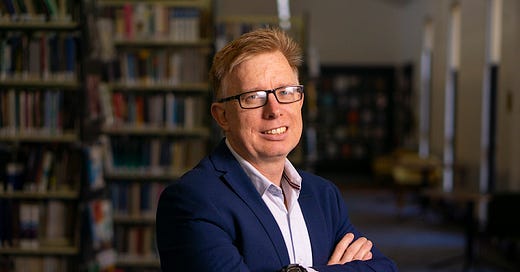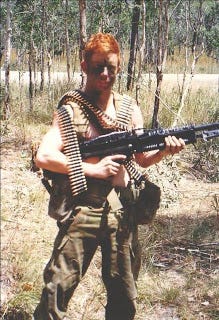To answer the question, “Who is Mike Bird?” I thought I’d provide readers with a short bio beyond the blurb you get on the back of books or on my college’s faculty page.
Origins Story
I’m Michael Frank Bird, 46 years old (b. 1974), Christian, Husband, Dad, ex-soldier, Anglican priest, biblical scholar, and coffee-despiser.
I was born in Paderborn, West Germany, to Daphne and Eric Bird. Eric was an armored cavalry soldier in the British Army, Daphne was a feisty red-headed Welsh barmaid. Sadly, the marriage ended on account of Eric’s affair with another woman. When I was four years old my mother and I moved to Australia where her mother and sister lived, specifically, Brisbane. I never met Eric until I was 18 years old.
Daphne eventually remarried Andre in 1980, the first-generation son of Yugoslav immigrants, he was a postman with a good sense of humor. They had a child, my half-brother Dean, who I would always be close to. Life in suburban Brisbane was okay, we were working class, not remotely religious, liked having friends over and a BBQ. I went to Kruger State School and then onto Redbank Plains High School. Good memories of a backyard pool, front yard cricket, and holidays on Queensland’s Sunshine Coast. However, around 1987, Andre developed a gambling problem to which Daphne responded by developing a drinking problem. The result was a kind of spiral of mutual dysfunction and abuse with Daphne and Andre trying to out-do each other in who could be most destructive to the family. It was a hard time watching my parents, who loved me very genuinely and sincerely, become self-destructive and spasmodically abusive. My teenage years were then a mixture of love, neglect, and depression.
I was a very lonely teenager, bright-ish, but physically quite petite despite being very good at sports. I was a target for bullies and girls never seemed to like me. I loved cricket, then kickboxing, then musical theatre. I aspired to be a lyricist for West End and Broadway musicals and even tried writing a few musicals. I had a few friends, but it was not a pleasant time in my life.
Homelife soon became hellish as my parent’s dysfunctions increased. They separated several times with Dean and me caught between them. They almost had the house repossessed. Anything of value was pawned to pay bills or to pay for habits. My parents once pilfered my rare coin collection and sold it to use as money for booze and gambling. Quite sadly, Daphne became an angry drunk and Andre descended ever deeper into gambling addiction. I had to hide my lunch money from both of them or else I’d go hungry at school. I got kicked out of home a few times. Took a couple of beatings. As it turns out, alcoholics don’t like it when you pour their booze down the sink and gamblers don’t like it when you ask them what a bookmaker’s penis tastes like. It wasn’t all bad, I got fed, birthday presents, driven to sport, even the odd “well-done.” Coming home after school was always a matter of, “Gosh I hope mum is sober!” and “How impoverished will we be this week thanks to Dad’s poor choices?” I’ve had to wrestle with my parent’s failings and tried to remember that their failings should not define them. It is not the sum of who they are and there were some good times there as well. But the stress took a terrible toll on me and I engaged in self-harm which led to regular weekly meetings with a school psychologist.
I was a B student, not dumb, but not particularly brilliant. I loved English, Economics, Gym, and hated Maths. I couldn’t get into university because of average grades, besides courses on nursing, horticulture, and meat-works inspection which did not remotely interest me. So I thought I’d join the army - even though I was only 17 years old and weighed a paltry 47 kg.
Army Years
I served in the Australian Army from 1992 to 2005. I started out in the Ready Reserve Scheme which was one year full-time and four years part-time. The basic training was hard. I was physically, mentally, and emotionally immature. I really struggled. I had grand visions of being a special forces soldier, but I could barely manage the “combat fitness,” that is, carrying a rifle and back-pack up a mountain, and trying to march at the same pace as six-foot Nephilim. One of my roommates, Tim Aplin, would later die in a chopper crash in Afghanistan. I was assigned to the infantry and gradually got physically stronger, more confident, and more able to be an adult - skills I had never acquired. By the end of the year, I had gone from being a scrawny chicken who hardly coped with life to a functional adult recommended for promotion. The army gave me discipline and the ability to push through pain and opposition without folding like a card table - this is why I support conscription.
I served eighteen months part-time in a reserve unit, in my spare time mostly trying to become a lyricist to no-avail, writing a musical with a gay pianist who kept trying to set me up with his gay friends. I visited the USA for the first time and then went on to the UK to meet my father Eric and his wife Joanne. It went okay. We got along reasonably well, we were clearly similar in being introverted and fixated on things - for me musicals, for him it was trains - but it was kind of weird. I don’t think he was entirely expecting to meet me as he had shown no interest in me before that time - no phone calls, cards, letters, not even, “Are you okay son?” It was cordial, but there was a real emotional distance that could not be traversed. I guess I could have tried better to connect with him, but time and distance made it difficult.
I returned to Australia and was invited to join the regular Army, I accepted, I was assigned to 3 RAR, the parachute regiment based in Sydney. I did two years at 3 RAR which was hard in some ways, many of my comrades were thugs who did not socialize well with others. During this time I worked with Lt. Luke Gosling who would later go on to become the ALP member for Darwin. Army life was mostly okay. I was well-paid, saved up lots of money, it kept me fit, made some good friends, but otherwise engaged in a life of work-hard and play-hard, with play focused on booze and chasing girls.
Parachuting was okay, but it’s not sports parachuting, it is physically hard. I saw some guys get really, really hurt crumping into the ground. Plus, once you land, you have to walk, walk, and bloody walk everywhere carrying everything. By the time I was twenty-one, I had had enough. I wasn’t built to be a pack mule or to charge up a mountain carrying 25 kg of weapons and ammo. I had to do something different. I liked military history, statistics, policy, and analysis, so I thought, “Maybe military intelligence!” So I entered the Chief of Army’s essay competition and a few months later I got called into the boss’s office to explain why the Chief of Army had sent me a letter. It was a congratulations letter on my submission to the competition even though I didn’t win. This intimated that my gifts were more intellectual than physical. I was then given an internal posting to the battalion “Int Section” which was a much better line of work for me, which I excelled at, and was able to transfer to Military Intelligence Corps permanently.
Conversion
Growing up, I never liked religious people. They seemed judgmental, arrogant, deluded, and hypocritical. Well, that was what the culture led me to think, I didn’t know any Christians or anyone remotely religious. I had very limited exposure to religion. There was Christian TV at like five a.m. and Ned Flanders on The Simpsons. I was an atheist with a weirdly chivalrous sense of morality, which was inconsistent, but I didn’t know it at the time.
At my high school graduation in 1991 the school chaplain, Graham Semple, gave a powerful challenge, “The most important decision you’ll ever make is whether you choose to accept or reject Christ!” I just rolled my eyes at the time, but his words actually stuck with me, and years later, I would recall them.
While at 3 RAR, a guy called “Ned” invited me to church. I went along out of sheer boredom. I was sick of night-clubs, drinking, girls asking me to buy them drinks, and guys fighting over girls. I’d rather play video games or read.
I went along to Wattle Grove Baptist Church (now Southwestern Baptist Church) just outside Liverpool in Sydney. It was a young church plant that soon had a young pastor fresh out of Morling College named Craig Corkill. I was expecting a bunch of moralizing geriatrics and religious fanatics - and they weren’t. They were normal people, mostly young couples, a few middle-aged, and some elderly. The worship and sermon struck me as a bit weird, but otherwise it was a real community of faith. And they were different, very different, strangely different, enticingly different. I kept attending. They treated me so wonderfully. I was invited to dinners and all things.
Eventually, a local pastor, Steve Grose, gave me a gospel tract, which I read one night in August 1994. I had begun reading the Bible, I was particularly moved by reading the Gospel of John, the Jesus there was wise, loving, and offered eternal life. And then, one night, it was like it all made sense, sin, my own sin, Jesus, and the need for redemption. So I prayed to receive Christ and felt myself, as it were, born again. The world has been a different place ever since. Thereafter I was discipled by Ps Craig Corkill, who took me under his way, mentored me, encouraged me, and noticed my burgeoning interest in theology. It was a time of growing in the faith, reading Scripture, memorizing Scripture, and earnestly seeking God’s will. In fact, when I left Wattle Grove, Craig gave me Millard Erickson’s Christian Theology as a farewell gift. A portent of where I would eventually end up.
Part Two will talk about moving to Townsville, meeting my wife Naomi, Bible College, and beginning scholarship.




